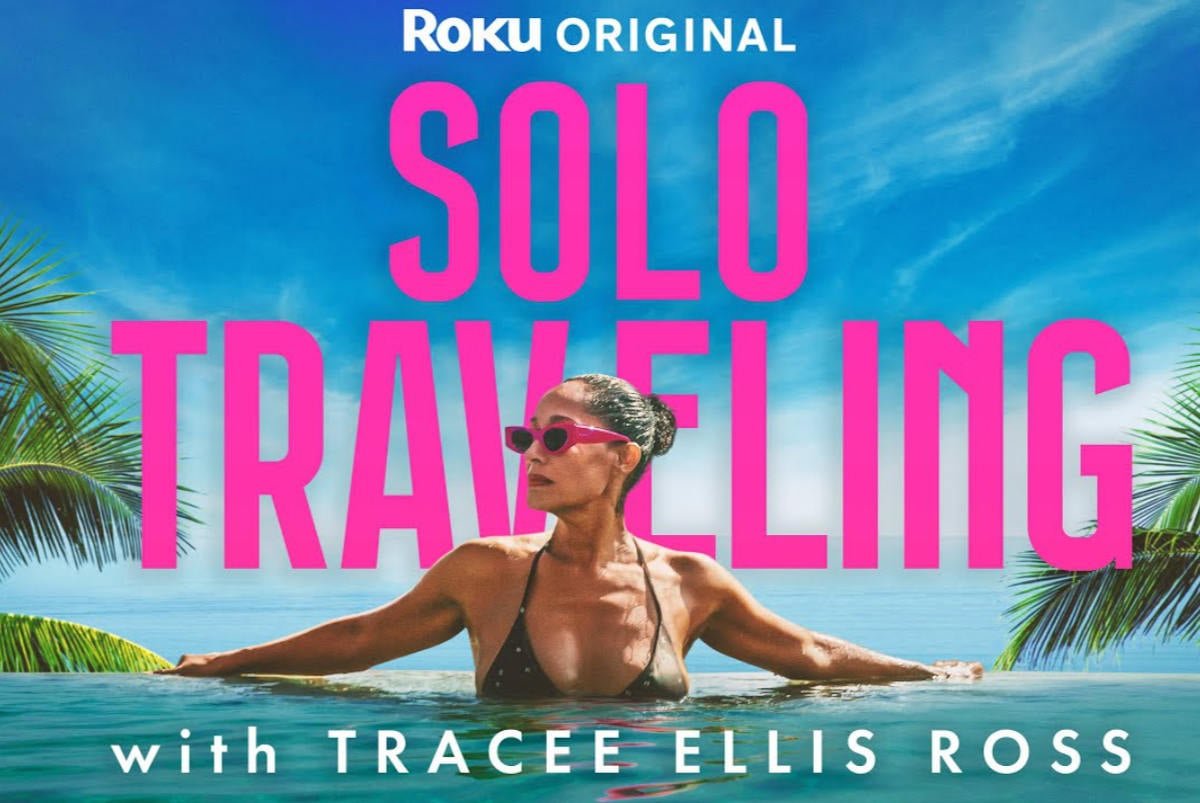Solo Travellers
The Business Traveler of Today is Changing—and So Is Their Flight Map

“I’ve noticed when you’re flying to countries within the African diaspora, there’s a sense that most of the people on the flight aren’t there for a holiday,” he says. “There is a sense of familiarity; it’s people traveling to London for work or traveling back for the same. They aren’t necessarily tourists.”
Bernard spends weeks to months at a time in the UK or Brazil, where regional genres like grime and baile funk are taking off. “Places like Brazil are leading nightlife, club culture, and underground music at the moment,” he tells Traveler. “There is a real DIY culture and community.”
Across the pond, North American passengers are flocking to South Korea as a top trending destination. One of the most popular airline routes in the US this summer was Los Angeles to Seoul, according to July 2025 data from OAG, an aviation analytics company.
For LA-based content creator Roger Who, traveling to Seoul has become essential for his work in the skincare and beauty space. Recent years have seen the K-beauty market explode in South Korea, in part thanks to treatments and services popularized by viral TikTok and Instagram videos. The boom has transformed business and tourism in the country: Over 1 million foreign patients traveled to South Korea from 2023 to 2024 for treatments including skincare procedures, medical services, and color analysis, per a Business of Fashion report.
Various airlines serving the Asia market are investing more in their US-South Korea connectivity. Air Premia—Who’s go-to airline—recently increased its LAX flight schedule from seven to 10 flights per week in March 2025. Meanwhile, Korean Air has increased passenger capacity on the route with larger Airbus A380 aircraft and plans to bump its weekly service to LAX from four to five flights starting in August 2025.
Over the last five years, the two cities have become the global capitals of the digital creator economy. “Both LA and Seoul have a really strong culture around appearance and self-care,” Who says. “In LA, we have this intersection of entertainment, wellness, and beauty, which creates an audience that looks for influencer-led discovery and beauty education. Seoul has this similar energy.”
While Who’s trips to Seoul are primarily work focused, he makes sure to carve out time for leisure as well. As with many modern careers in the digital age, the line between work and play is not always obvious: “Even when I’m going out with friends to do things completely unrelated to beauty, I often find myself wanting to film those moments because they’re just so cool or unique,” Who says.
As more young professionals combine business and leisure trips into single-ticket itineraries—a trend coined as bleisure—they’ve permanently shifted where and when business travel can take place. Previously, “a passenger flying alone on Monday morning without a checked bag was a business traveler, and two or more people on an itinerary involving a weekend was a leisure trip,” says Gary Leff, an aviation expert and Condé Nast Traveler travel specialist. “But now that weekend trip with a spouse or partner might start earlier in the week, include business, and extend into the weekend. The traditional Monday to Thursday business travel week for the consultant class is over.”
Solo Travellers
The $1 Trillion Wellness-Driven Consumer Revolution and How to Invest in It

The global solo travel market, valued at $482.5 billion in 2024, is projected to surge to $1.07 trillion by 2030, growing at a blistering 14.3% CAGR. This explosion is not merely a post-pandemic rebound but a seismic shift in how people engage with the world. Solo travel is evolving into a $1 trillion wellness-driven consumer revolution, fueled by Gen Z and Millennials prioritizing self-discovery, digital nomadism, and hyper-personalized experiences. For investors, this trend offers a golden opportunity to capitalize on three pillars: lifestyle brands, experiential tech, and emotional wellness platforms.
The Market’s Growth Drivers: A Perfect Storm
The solo travel boom is underpinned by three key forces:
1. Post-Pandemic Behavioral Shifts: The pandemic normalized solitude, with 76% of Millennials and Gen Z planning solo trips in 2025. Solo travel is now seen as a path to self-care, mental health, and meaningful social connections.
2. Digital Nomadism: Hybrid work models have turned travel into a lifestyle. Digital nomads, who often stay in destinations for months, are reshaping demand for flexible accommodations, co-working spaces, and wellness-focused stays.
3. Experiential Consumption: Consumers increasingly value experiences over material goods. Solo travelers seek transformative journeys—wellness retreats, cultural immersion, and immersive tech-enhanced adventures.
Lifestyle Brands: Reimagining Hospitality for the Solo Traveler
Hotels and resorts are redefining their offerings to cater to solo travelers. Hilton and The Oberoi Beach Resort in Mauritius, for instance, have introduced “MeMooning” and “Touching Senses” programs, respectively. These include flexible seating, personalized dining, and wellness activities like stargazing and painting.
Investors should target brands that:
– Prioritize Solo-Friendly Design: Look for properties with private spaces, co-working areas, and safety-focused amenities (e.g., women-only tours).
– Leverage Niche Demographics: Women now account for most solo bookings, driven by empowerment and safety innovations. Brands like A&O Hostels in Europe, which blend work-friendly infrastructure with social hubs, are prime candidates.
– Integrate Wellness: The Oberoi’s $200-per-night “Touching Senses” package, which includes cultural workshops and mindfulness sessions, reflects a growing demand for purpose-driven stays.
Experiential Tech: The AI-Driven Travel Revolution
Technology is the backbone of the solo travel renaissance. AI-powered platforms like Booking.com and Expedia are now offering hyper-personalized itineraries, real-time safety alerts, and dynamic pricing models. Startups are emerging to fill gaps in solo-specific services:
– AI Itinerary Planners: Tools like Much Better Adventures use machine learning to curate adventure-based trips, fostering “type two fun” (shared challenges that build connections).
– Sustainability Platforms: Apps like GreenGo integrate carbon calculators and eco-certified accommodations, appealing to eco-conscious solo travelers.
– AR/VR Integration: Virtual reality tools are enhancing pre-trip planning, while AR apps provide real-time cultural context during visits.
Investors should focus on tech companies that:
– Address Safety and Flexibility: Real-time risk assessment tools and solo-inclusive pricing models are critical for trust-building.
– Gamify Wellness: Platforms that reward eco-conscious behavior or mindfulness practices (e.g., Calm‘s travel-specific meditations) align with Gen Z’s values.
– Scale via Partnerships: Collaborations with local governments or tourism boards (e.g., verified stay directories) enhance credibility and adoption.
Emotional Wellness Platforms: The New Travel Essential
Solo travel is increasingly intertwined with mental health. Platforms like Headspace and Calm have expanded their offerings to include travel-specific content, such as guided meditations for long flights or stress-relief exercises for navigating unfamiliar environments.
Emerging startups are carving out niches:
– Moodfit and Worry Watch help travelers track emotional triggers and apply cognitive-behavioral techniques.
– Erika’s Lighthouse provides free mental health resources for young solo travelers, addressing loneliness and anxiety.
– Peer-to-Peer Networks: Platforms like SoloNomads connect travelers for shared adventures, blending social interaction with self-discovery.
Investors should prioritize platforms that:
– Offer 24/7 Accessibility: Solo travelers need on-demand support, especially in time zones with limited local resources.
– Integrate with Travel Infrastructure: Partnerships with airlines, hotels, or insurance providers (e.g., solo-specific travel insurance) create sticky ecosystems.
– Leverage AI for Personalization: Apps that adapt to user behavior (e.g., suggesting a yoga session after a long hike) will dominate.
Strategic Investment Playbook
- Lifestyle Brands: Target mid-sized hospitality chains with agility to innovate (e.g., Marriott’s niche brands like Residence Inn for extended stays).
- Experiential Tech: Invest in AI-driven startups or acquire them via larger travel firms (e.g., Expedia’s potential M&A activity in solo-specific tech).
- Wellness Platforms: Focus on apps with strong user retention and partnerships with travel insurers or employers (e.g., Headspace for Business).
The solo travel market is not just about selling trips—it’s about selling freedom, self-discovery, and emotional resilience. For investors, the key is to align with companies that understand this shift and are building ecosystems where solo travelers thrive. As the market nears $1 trillion, the winners will be those who blend technology, wellness, and personalization into seamless, transformative experiences.
The time to act is now. The solo travel revolution is not a passing trend—it’s the future of how we live, work, and connect.
Solo Travellers
Solo Traveling with Tracee Ellis Ross Renewed for Season 2

Roku Originals has given the green light to season two of Solo Traveling with Tracee Ellis Ross, following the breakout debut of its first season. With record-breaking viewership, the series has become the most-watched unscripted Roku Original within the first two weeks of launch in terms of unique viewers.
Blending humor, heart, and honesty, Ross’s solo adventures resonated with audiences around the world and sparked conversations about the joys of traveling alone and the power of self-discovery. Season 1 followed Ross’s journeys through Morocco, Mexico, and Spain.
In Season 2, fans can look forward to even more meaningful moments and scenic escapes as Ross sets off to new destinations — with (many) checked bags in tow. All episodes will be available for free exclusively on The Roku Channel.
“‘Solo Traveling with Tracee Ellis Ross’ is the #1 unscripted show in Roku history, and now we get to do it all again with a Season 2! Thank you to Roku for your incredible partnership and care with my show, and to the amazing team that made it all possible,” said Tracee Ellis Ross (Black Mirror, Black-ish, Girlfriends).
She continued: “But the biggest thank you goes to everyone who has watched, embraced, and shared my journeys. The way the show is resonating feels truly special—all of the comments, the conversations, the connection… my cup runneth over.
“So here’s to all the solo travelers out there, the aspiring solo travelers, those who share in the joy of solo travel by watching me do it and, of course, to my fellow over-packers! There’s so much more to see and do—the world is our oyster! I can’t wait to see where I’ll be going next and to bring all of you along.”
“Tracee Ellis Ross has set a new gold standard for unscripted storytelling,” said Brian Tannenbaum, Head of Roku Originals. “Her show didn’t just perform—it soared. The response from our streamers has been overwhelming, and we’re deeply grateful to have Tracee returning to guide us through another season filled with heart, purpose, and adventure.”
“‘Solo Traveling with Tracee Ellis Ross’ has struck a powerful chord with audiences, blending inspiration, culture, and authenticity in each destination,” said Olivia LaRoche, Head of Alternative Originals.
LaRoche added: “We’re thrilled to bring it back for another season, with even more of what viewers love: deep stories, bold adventures, and Tracee’s signature spirit that continues to empower, explore, and entertain.”
Joy Mill Entertainment, Artists First, and Story Syndicate produced the first season. Tracee Ellis Ross, E. Brian Dobbins, and Anna Chai serve as executive producers.
Adriana Ambriz and Caroline Soss serve as co-executive producers. Dan Cogan, Liz Garbus, Jon Bardin, Tommy Coriale, and Kate Barry serve as executive producers for Story Syndicate. Olivia LaRoche and Louisa Lenander Friedman oversee the series on behalf of Roku Originals.
Season 1 of Solo Traveling with Tracee Ellis Ross is now streaming for free exclusively on The Roku Channel. The Roku Channel is easy to watch and available to stream for free, no subscription or sign-up required. In addition to Roku devices, The Roku Channel is available on web, iOS, and Android devices, Amazon Fire TV, and select Samsung TVs.
Solo Travellers
Tracee Ellis Ross’ solo travels come with a mixed bag of emotions

Tracee Ellis Ross is a revered actress and co-CEO of Pattern, the haircare company she founded in 2019. Ross’ newest endeavor is her new show that follows along as she travels the world on her own, embraces her individuality, and skirts the societal expectations for women in their 50s.
At 52, Ross sometimes feels the weight of other people’s opinions — positive and negative — about her being unpartnered and child-free.
On her show, Solo Traveling with Tracee Ellis Ross, she takes viewers along as she goes from destination to destination by herself, and aims to shift that narrative that others tend to have about her life, by leaning into solitude.
“I mean Oprah said it, she said I’m the poster child for singledom. I don’t wanna be that,” Ross says in show’s the first episode. “I wanna be the poster child for being and inhabiting your own skin, for living in your own skin.”
The series is available on the Roku Channel and in the show’s three episodes, Ross travels to Morocco, Mexico and Spain.
I wanna be the poster child for being and inhabiting your own skin.
Throughout her adventures, Ross tastes different olive oils, supports a female-run restaurant and takes a cocktail-making class. Sometimes she has not-so-great experiences like a change of plans because of the weather and feeling lonely after a solo dinner. But Ross embraces it all.
“So much of what solo traveling is about, for me, [is] not waiting for something in order to walk towards my life, in order to be in my life, in order to experience my life. I think that was why I took my first trip solo,” Ross said.
“Not having a relationship, a long long relationship, not having children has allowed me to explore things of my own humanity. It has deposited me here at 52 in an extraordinary experience that is filled with joy, loneliness, grief, exuberance, delight, like literally all of it, and I feel available to it.”
Solo traveling can expose you to both good and bad things—and get you out of your comfort zone
There are pros and cons to any experience, says Millie Huckabee, licensed clinical professional counselor and founder and CEO of Sage Therapy. Solo traveling is no different.
When solo traveling, there’s “so much opportunity for things to come up. You’re in an unfamiliar situation,” says Huckabee who spent two weeks exploring Malawi on her own in her past.
“You’re exposed to things that are outside of your everyday experience, which can be good and bad. That sort of mixed bag [of emotions] is part of that.”
Some positive effects that visiting places alone can have on a person are:
- Getting you out of your comfort zone
- Allowing you to meet new people
- Opening you up to novel experiences
- Increasing feelings of joy, awe and empowerment
- Allowing you to gain more insight and think about things more deeply
On the flip side, Huckabee says solo travel can also cause you to:
- Look inward and feel emotions you may have distracted yourself from
- Reminisce about past travel experiences or wonder how different your trip would be if you weren’t alone
- Feel lonely, especially when you see other people traveling together
- Navigate challenging situations on your own
Challenging your worldview can be so good, and it can be really hard, too.
Millie Huckabee
Founder and CEO of Sage Therapy
To prepare for the ups and downs that may come with visiting places alone, Huckabee suggests being optimistic about your trip while acknowledging it won’t be perfect, and developing safety precautions like knowing where you can receive medical care and having translation apps ready to communicate with residents of the country.
It can also help to have good coping strategies you can reach for when you’re feeling lonely, she says. These tools can range from reaching out to loved ones who boost your mood, or journaling and recording voice memos to process your emotions.
“Opening your mind and challenging your worldview can be so good, and it can be really hard, too. But I don’t know, I highly recommend it,” Huckabee says.
“You can really learn great things about yourself and really develop amazing relationships with new people that you never would have met otherwise.”
Want to stand out, grow your network, and get more job opportunities? Sign up for Smarter by CNBC Make It’s new online course, How to Build a Standout Personal Brand: Online, In Person, and At Work. Learn from three expert instructors how to showcase your skills, build a stellar reputation, and create a digital presence that AI can’t replicate. Sign up today with coupon code EARLYBIRD for an introductory discount of 30% off the regular course price of $67 (plus tax). Offer valid July 22, 2025, through September 2, 2025.
Plus, sign up for CNBC Make It’s newsletter to get tips and tricks for success at work, with money and in life, and request to join our exclusive community on LinkedIn to connect with experts and peers.
-

 Brand Stories3 weeks ago
Brand Stories3 weeks agoBloom Hotels: A Modern Vision of Hospitality Redefining Travel
-

 Brand Stories2 weeks ago
Brand Stories2 weeks agoCheQin.ai sets a new standard for hotel booking with its AI capabilities: empowering travellers to bargain, choose the best, and book with clarity.
-

 Destinations & Things To Do3 weeks ago
Destinations & Things To Do3 weeks agoUntouched Destinations: Stunning Hidden Gems You Must Visit
-

 Destinations & Things To Do2 weeks ago
Destinations & Things To Do2 weeks agoThis Hidden Beach in India Glows at Night-But Only in One Secret Season
-

 AI in Travel3 weeks ago
AI in Travel3 weeks agoAI Travel Revolution: Must-Have Guide to the Best Experience
-

 Brand Stories1 month ago
Brand Stories1 month agoVoice AI Startup ElevenLabs Plans to Add Hubs Around the World
-

 Brand Stories4 weeks ago
Brand Stories4 weeks agoHow Elon Musk’s rogue Grok chatbot became a cautionary AI tale
-

 Brand Stories2 weeks ago
Brand Stories2 weeks agoContactless Hospitality: Why Remote Management Technology Is Key to Seamless Guest Experiences
-

 Asia Travel Pulse1 month ago
Asia Travel Pulse1 month agoLooking For Adventure In Asia? Here Are 7 Epic Destinations You Need To Experience At Least Once – Zee News
-

 AI in Travel1 month ago
AI in Travel1 month ago‘Will AI take my job?’ A trip to a Beijing fortune-telling bar to see what lies ahead | China













You must be logged in to post a comment Login